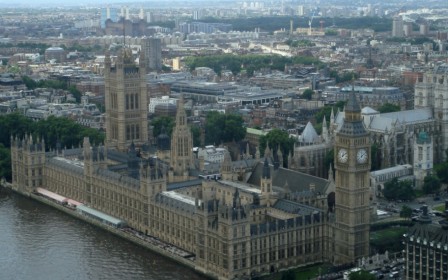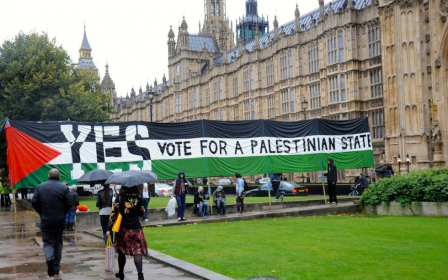The brakes come off: UK Parliament's vote on Palestinian statehood

At some point in the process that led to the end of the conflict in Northern Ireland, there was a audible snap, a break in the link between the mother ship, the British government, and Protestant Unionism which considers itself the last outpost of the British Crown on the island of Ireland. Was it the Anglo-Irish Agreement between Britain and Ireland, which that arch unionist Margaret Thatcher signed? Or was it the landing of the first helicopter from the Irish Republic at Hillsborough Castle, the residence of the British secretary of state?
For Israel, an umbilical cord carrying the lifeblood of the state extends between it and Washington. Just imagine the speeches in the British Parliament which voted to recognise Palestinian statehood on Monday, being uttered on Capitol Hill. They would have been unrepeatable in the US Congress.
Nevertheless, there was an audible snap in Britain on Monday night. Freed of the burden of saying what Israel and its lobby demanded to hear, politicians of right and left said what they felt.
Sir Richard Ottaway, the Tory chair of the Foreign Affairs Committee, one who, in his own words had stood by Israel through thick and thin said that such was his anger at the Israeli government's annexation of 950 acres of the West Bank, that he would abstain.
Sir Alan Duncan, the former Tory minister for international development compared the settlements in the West Bank to the apartheid system of South Africa and said they represented a "wicked cocktail" of occupation. In a speech to the Royal United Services Institute, the chief think tank of the British defence establishment, on Tuesday Duncan said:
"Anyone who supports illegal Israeli settlements in Palestinian land is an extremist who puts themselves outside the boundaries of democratic standards. They are not fit to stand for election or sit in a democratic parliament."
That judgement applies to most of the Israeli cabinet and certainly its prime minister Benyamin Netanyahu, who said on 11 July:
"There cannot be a situation, under any agreement, in which we relinquish security control of the territory west of the River Jordan."
Netanyahu went on to say that if Israel relinquished Judea and Samaria, the biblical vocabulary every Israeli politician uses for what Duncan described as stolen land, they would create another "20 Gazas".
Netanyahu has created major problems for anyone trying to sell the line that a vote for Palestinian statehood was a vote against attempts to restart negotiations with Mahmoud Abbas, the Palestinian President, because unilateral recognition prejudiced the outcome.
Simply, that line has few takers according to the vote that was carried overwhelmingly. Whatever Israel claims are its intentions, its facts on the ground now speak louder than words. 600,000 settlers in the West Bank and East Jerusalem, with their network of separate motorways, roads, walls, electricity and water says all anyone wants to know about Israel's intention of handing back the West Bank. It will not. It can not. No Israeli leader is strong enough to do it.
Israel's fury at the vote was uncontained, issuing a statement condemning the vote. But the silence of its UK ambassador Daniel Taub on Monday was complete. According to Haaretz, he refused to give interviews. He should reflect on the fact that if he is losing the support of establishment figures like Ottaway, he is losing the game. As Ottaway himself said: "I have to say to the Government of Israel that if they are losing people like me, they will be losing a lot of people."
In contrast, the Palestinian voice is becoming more prominent, as is the Labour Party's search of the British Muslim vote. The loss of Baroness Warsi, the foreign office minister who resigned over the government's inaction over Gaza, was felt by David Cameron, for the same reasons of centrist politics, because she was important to the conservative vote among British muslims.
Will anything change? Little in the immediate future, but the international community is moving on. Incrementally, Israel is losing impunity for its actions. The logic of Duncan's speech is that goods produced in the occupied territories should be boycotted. But how then do you separate those from goods produced in Israel within its 1967 borders? An academic boycott of Israeli institutions of higher education in the West Bank should, according to the same logic, be considered. There is a university now in Ariel, once a settlement , now a city, where house prices are booming.
Once you pull one thread out of the weave of policies supporting the status quo and the occupation, the whole cloth unravels. Make no mistake, this vote was a landmark moment. For this century and most of the last, Zionists have done everything they can to make Palestine disappear, and the Palestinians invisible - from the founding myth that the land they were settling was "empty", to the refugees, to the internally displaced, to every policy limiting the movement of Palestinians, and dictating where they can or can not live today.
After this vote, and others like it, Palestine and Palestinians are somewhat more visible. They have statehood and they have rights as citizens under occupation, rights that are enforceable in British courts as they are in international courts. For how much longer will a British government continue to apply its American dictated veto on moves to apply real pressure on Israel? When will the brakes come off?
- David Hearst is editor-in-chief of Middle East Eye. He was chief foreign leader writer of The Guardian, former Associate Foreign Editor, European Editor, Moscow Bureau Chief, European Correspondent, and Ireland Correspondent. He joined The Guardian, from The Scotsman, where he was education correspondent.
The views expressed in this article belong to the author and do not necessarily reflect the editorial policy of Middle East Eye.
Photo Credit: Palestinian children demonstrate near an Israeli check point in Hebron this August after they couldn't pass the checkpoint to get to school as it was closed off by Israeli security forces (AFP)
New MEE newsletter: Jerusalem Dispatch
Sign up to get the latest insights and analysis on Israel-Palestine, alongside Turkey Unpacked and other MEE newsletters
Middle East Eye delivers independent and unrivalled coverage and analysis of the Middle East, North Africa and beyond. To learn more about republishing this content and the associated fees, please fill out this form. More about MEE can be found here.





